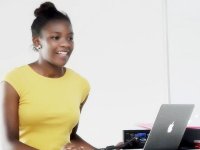How Assessment Can Lead to Deeper Learning
Your content has been saved!
Go to My Saved Content.Most educators, policymakers, and parents agree that today's students need a mix of knowledge, skills, and dispositions to prepare them to be successful and engaged citizens. Given that students need a mix of these things, educators, policymakers, and parents are also asking, "How do we know if students are learning both what we are teaching and what they need to know to succeed?"
One key to addressing both of those issues that we understand at our Envision schools is the understanding that they are inextricably linked. While in some circles, assessment is a top-down process done by teachers who decide where students are on the continuum of learning, we engage students directly in assessing their own progress. This is part of our Know, Do, Reflect approach to learning.
The reflection step in this ongoing learning cycle is an essential element where assessment happens. Reflection invites students and teachers to recognize growth and accomplishments as well as identify opportunities for improvement and development. It is not separate from the learning process: It is an integral step on the path to deeper learning -- it's assessment as learning.
Having students play an active role in this step is distinctive for two reasons:
1. The assessment process itself helps students develop critical thinking and analysis skills.
Students who assess themselves are learning and improving their cognitive skills while assessment is happening. For example, in our classrooms, students are often asked to reflect on what they know before, during, and after a particular lesson, inviting them not only to chart a course for the progress they want to make but also to understandwhat they already bring to the classroom. Before the lesson even begins, they are exercising muscles that develop an academic mindset, which prepares them to understand not only what they are learning but how they are learning it. Those skills will enhance their ability to learn, adapt, and grow in future classrooms as well as in career and life settings.
2. The process also helps students internalize knowledge, turning what and how they learn into a well of resources they can use in the future.
When students assess their own work, when they identify their own strengths and weaknesses, the likelihood that they will do better next time is greater. This is true, of course, for everyone, not just students. When our goals come from inside, rather than being imposed from an external source, we are more likely to own them and work harder to achieve them.
One of our graduates describes Deeper Learning this way:
"Deeper learning is when a student learns something beyond the content, when they are able to apply their experiences, or knowledge gained in other classes, to what they are doing. It means internalizing information."
Self-assessment leads to that "beyond the content" piece, and gives students the powerful awareness of where they are and where they want to go.
Envision students have multiple opportunities to engage in this kind of learning. In both tenth grade and then again as seniors, they are asked to assemble a portfolio of their best work, which they must "defend," dissertation-style, to an audience of educators, peers, and community members. They give similar presentations throughout their high school years, reflecting on each experience to improve the next one.
As students revise their portfolios, incorporating feedback from teachers and peers, they hone not only critical thinking and analysis skills, but also communication skills. As seniors, they must pass the "College Success Portfolio" defense in order to graduate, and many of them go through multiple revisions and attempts before successfully passing.
As another graduate describes it:
"Being put in a position to articulate a concept to an audience takes greater comprehension than just learning the idea for yourself. By talking about the project, I deepened my own knowledge of the math we were learning."
Talking about their own learning -- articulating it, reflecting on it, internalizing it -- engages students in the kind of assessment that continually reinforces skills, deepens knowledge, and prepares them for the future.
